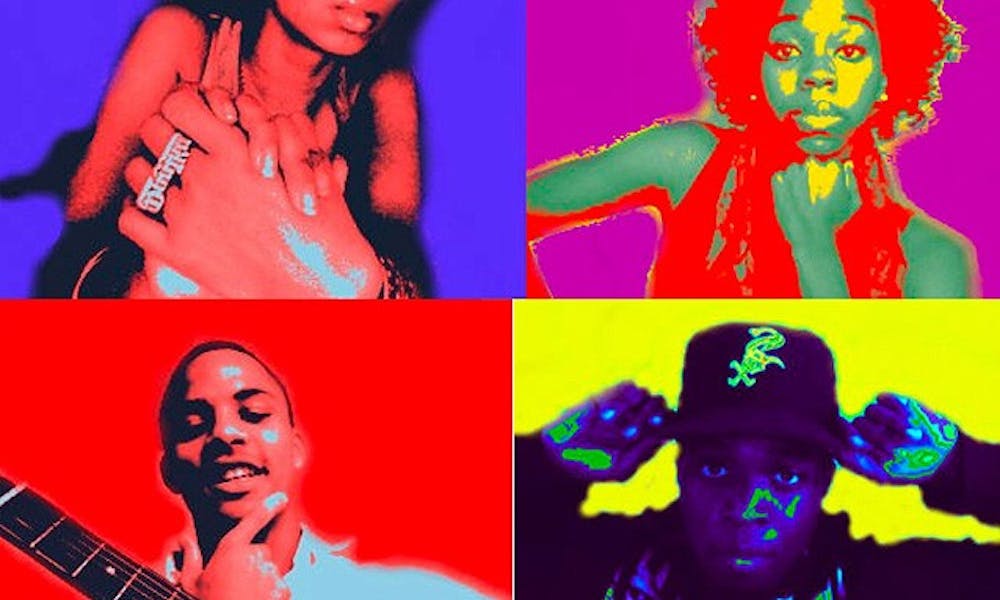For a group with such deliberate performances, Spoken Verb had quite the spontaneous beginning.
About two years ago, senior Noel Susberry and junior Danika Manso-Brown were in the car on the way to a dance conference when they started making up verses. Liking the material, they wanted to branch out with a campus organization. This past summer, Manso-Brown spoke with Deen Oloko and Alex Alston, both juniors she’d known since freshman year, about starting the University’s only spoken word club.
“We really just needed an outlet at Duke,” Manso-Brown said. ‘We needed a space to be creative.”
The only other spoken word club that Spoken Verb is aware of is the 2002 Local Colour, which consisted of nine members and had a political focus.
Like its predecessor, Spoken Verb’s primary tool of expression is dramatic vocalization, a style popularized in poetry slams. The group—whose slogan is “speak and make moves”—conveys socially conscious themes, centering primarily on issues faced by minorities and women, through a blend of poetry and performance. They intend to incorporate the art forms of dance and music into future shows, Manso-Brown said.
“A lot of our work can’t stand just being written down—yeah, it just would not survive,” she said.
The group members’ social interests are reflected in their majors. Oloko and Manso-Brown are both sociology majors, Susberry is studying political science and Alston, English. The group’s major courses have in turn enhanced the awareness of their poetry, Manso-Brown said.
Although their content is often autobiographical, the group also looks to the experiences of others for inspiration.
“The first things that come to you are the things that you’ve lived and the things that you’ve known about,” Alston said. “Then when you gain confidence, you think, ‘I can lend a voice to someone else who may not be heard.’”
The subject matter of Spoken Verb poetry is often heavy, but it is frequently delivered with humor. In contrast with more complex statements, which take time to absorb, humor hooks the audience instantly, Manso-Brown said.
“It’s not like, ‘Ha ha, that’s hilarious,’ it’s, ‘Ha ha, that’s so true,’” Manso-Brown said.
Oloko pointed to one of Manso-Brown’s poems, “Beautiful Like,” for the added relatability humor brings to the art form.
“We were once angels of kings/Seats were made vacant on crowded subways/Now we stand and watch as you sit across two seats/With legs spread wide as if your manhood were just that big,” goes one of the poem’s lines—hardly done justice in print.
The verse was among many to receive widespread laughter and snaps from an engaged Mary Lou Williams Center Oct. 15, the date of the group’s opening showcase. Spoken Verb has also co-hosted an open-mic night with IMPACT Christian Ministry and the multicultural selective living group Prism, and will host their third and final performance of the semester in December.
The group is pleasantly surprised with the response it has gotten so far. Though they would have been happy to bring in 20 people to the first showcase, members said, the Mary Lou was filled to standing room only. But what Alston found even more striking was the diversity of the audience members.
“Although the four of us are black or identify as black, this is not a black thing,” Alston said. “You don’t have to be black to like spoken word or to be a spoken word artist or to come to an event, and just to see the various faces—white faces, Latino, Latina faces, biracial people you couldn’t place in a race—that’s so uncommon at Duke in any kind of informal setting like this, to see that was really rewarding.”
Get The Chronicle straight to your inbox
Sign up for our weekly newsletter. Cancel at any time.

